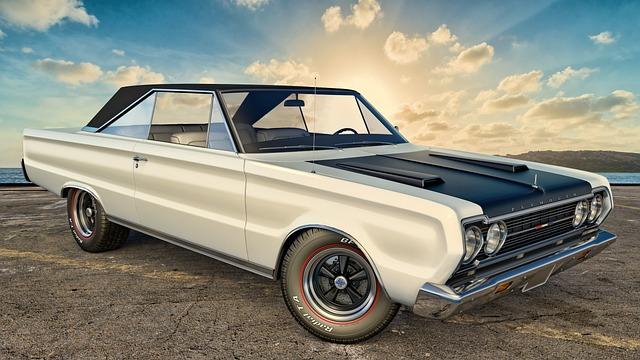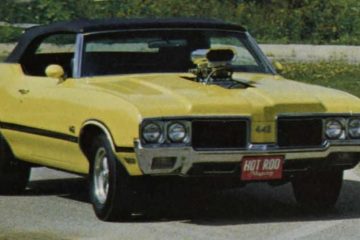The heartbeat of your Plymouth car lies within its engine, but what keeps that engine cool and performing at its best is often overlooked—the radiator. Picture a silent hero, hidden behind the grille, tirelessly regulating temperatures to ensure your ride stays smooth and reliable. In this article, we delve into the world of Plymouth car radiators, exploring their crucial role, common issues, and maintenance tips to keep your beloved vehicle cruising in top form. Join us on this journey through the cooling system realm, where the unsung radiator takes center stage.
Table of Contents
- – Enhancing Plymouth Car Performance: A Comprehensive Guide to Radiators
- – Choosing the Right Radiator for Your Plymouth: Factors to Consider
- – Top Recommendations for High-Quality Radiators to Keep Your Plymouth Running Smoothly
- – Radiator Maintenance Tips to Ensure Longevity and Efficiency for Your Plymouth Vehicle
- Q&A
- In Summary


– Enhancing Plymouth Car Performance: A Comprehensive Guide to Radiators
Enhancing the performance of your Plymouth car involves paying attention to various crucial components, with radiators playing a significant role in maintaining the engine’s temperature. Upgrading your radiator can lead to improved cooling efficiency, preventing overheating issues and enhancing overall engine performance. When selecting a radiator for your Plymouth, consider factors such as material quality, design, and compatibility with your vehicle model to ensure optimal functionality.
Investing in a high-quality radiator not only enhances your Plymouth’s cooling system but also contributes to the longevity of your engine. By choosing a radiator that is specifically designed for your car model, you can ensure a proper fit and seamless integration, allowing for efficient heat dissipation and temperature regulation. Regular maintenance, such as checking for leaks, flushing the radiator, and adding coolant when needed, is essential to keep your Plymouth running smoothly and to maximize the performance benefits of a quality radiator.
– Choosing the Right Radiator for Your Plymouth: Factors to Consider
When it comes to selecting the perfect radiator for your beloved Plymouth, there are several essential factors to consider to ensure optimal performance and longevity. Material: The material of the radiator plays a crucial role in its durability and efficiency. Options like aluminum radiators are lightweight and offer excellent heat dissipation, while copper radiators are known for their superior heat transfer capabilities. Consider the material that best suits your driving needs and conditions.
Size and Fit: Ensuring the radiator fits your Plymouth model perfectly is key to preventing any issues down the road. Take into account the dimensions of the radiator, including height, width, and depth, to guarantee a seamless installation that aligns with your vehicle’s specifications. Compatibility is key to a well-functioning cooling system, so be sure to double-check the fit before making your selection.

– Top Recommendations for High-Quality Radiators to Keep Your Plymouth Running Smoothly
When it comes to ensuring your Plymouth runs smoothly, investing in a high-quality radiator is essential. Radiators play a crucial role in regulating your car’s engine temperature, preventing overheating and potential damage. To help you make the right choice, we’ve compiled a list of top recommendations for radiators that you can consider for your Plymouth:
- Brand A Radiator: Known for its superior cooling performance and durability, Brand A radiators are designed to withstand even the most challenging driving conditions.
- Model B Radiator: With its efficient heat dissipation capabilities, Model B radiators are a popular choice among Plymouth owners looking for reliability and longevity.
- Company C Radiator: Utilizing advanced technology, Company C radiators offer optimal cooling efficiency, ensuring your engine operates at the right temperature at all times.
Each of these radiators is engineered to meet the specific cooling needs of Plymouth vehicles, providing you with peace of mind and optimal performance on the road. Whether you’re planning a long road trip or simply commuting to work, investing in a high-quality radiator can make a significant difference in your car’s overall performance and lifespan.


– Radiator Maintenance Tips to Ensure Longevity and Efficiency for Your Plymouth Vehicle
Maintaining your Plymouth vehicle’s radiator is essential for its longevity and optimal performance. To ensure your radiator works efficiently, regular upkeep is key. Start by checking the coolant level and quality. **Proper coolant levels and condition help prevent overheating and corrosion, allowing your radiator to operate smoothly**. Additionally, inspect the radiator hoses for any signs of wear or leaks. **Replacing worn-out hoses can prevent coolant leaks and potential engine damage**.
Another vital aspect of radiator maintenance is cleaning. Periodically flushing the radiator helps remove built-up debris and contaminants, preserving its cooling capacity. Moreover, inspecting the radiator cap and ensuring it seals properly is crucial for maintaining optimal pressure levels within the system. A faulty cap can lead to coolant loss and overheating. By adhering to these maintenance tips, you can enhance your Plymouth vehicle’s radiator efficiency and overall performance, ultimately contributing to a longer lifespan for your car.
Q&A
Q: Why is it important to maintain your Plymouth car radiator?
A: Proper maintenance of your Plymouth car radiator is crucial to ensure optimal engine performance and prevent overheating issues. By keeping your radiator in top condition, you can significantly extend the lifespan of your vehicle.
Q: How can I tell if my Plymouth car radiator needs repairs or replacement?
A: Watch out for warning signs such as coolant leaks, visible corrosion or rust on the radiator, overheating engine, or a sweet smell coming from the engine bay. If you notice any of these indicators, it’s best to have your radiator inspected by a professional mechanic.
Q: What are some common causes of radiator problems in Plymouth cars?
A: Common reasons for radiator issues in Plymouth cars include coolant leaks due to worn-out hoses or gaskets, clogging caused by debris or sediment buildup, and corrosion from old coolant or external factors like road salt.
Q: How often should I flush and refill the coolant in my Plymouth car radiator?
A: It’s generally recommended to flush and refill the coolant in your Plymouth car radiator every 30,000 to 50,000 miles or every 2 to 5 years, depending on your driving habits and the manufacturer’s guidelines. Regular coolant maintenance helps prevent corrosion and ensures proper engine cooling.
Q: Are there any DIY tips for maintaining my Plymouth car radiator?
A: While some basic radiator maintenance tasks can be performed at home, such as checking coolant levels, inspecting for leaks, and cleaning debris from the radiator fins, more complex issues like radiator repairs or replacements should be left to professional mechanics to ensure proper care of your vehicle.
In Summary
Whether you’re a vintage automobile enthusiast or a proud owner of a classic Plymouth, ensuring your car’s radiator is in top condition is key to keeping your ride running smoothly. By understanding the importance of proper radiator maintenance and potential signs of radiator issues, you can prolong the life of your beloved Plymouth and enjoy many more miles on the road. Don’t let overheating put a damper on your driving experience – stay vigilant, stay informed, and keep your Plymouth cool as a cucumber with a well-maintained radiator. Here’s to smooth rides and cool engines ahead!




0 Comments